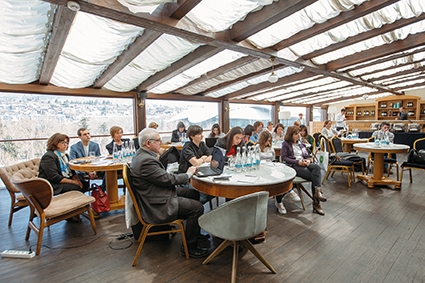EU-funded Projects in Georgia Present their Achievements
For the 10th anniversary of the Eastern Partnership, Georgia organized an informal gathering with leading media representatives to discuss the results obtained through EU-funded programs. GEORGIA TODAY was among the attendees.
The EU Cross Border Cooperation (CBC) Black Sea Program presented the innovative waste management practices of the Georgian city of Kutaisi. Georgian basketball player Anatolii Boisa, featured in the promotional video produced by the EU-funded project on plastic-free rivers, came to the event to support the initiative.
Ketevan Tskhakaia, Executive Director of Imereti Scientist’s Union SPECTRI, is in charge of the waste management project. She explains: “We are implementing a project supporting waste management in Kutaisi. They are several official documents which have been adopted by the government, such as national strategies of waste management, and each municipality has adopted these and has its own municipal plan of waste separation. Our project is about plastic, paper and glass separation, and we collect them separately in Kutaisi. Another part of the project is composting, with a composting field for green waste to be built.”
Poti is another city where waste management will be implemented for a cleaner Black Sea. The city is located on the Black Sea coast and the bank of the Rioni River, which makes it a strategic point. They will take the example of Kutaisi’s project for their own success.
“We also have awareness activities such as clean up actions for school students and training for target groups or summer camps,” Tskhakaia noted, adding that she is very optimistic about the population’s motivation to take action for waste management. “Projects are already proving very successful because civil awareness is quite high.”
The Eastern Partnership Territorial Cooperation project then presented its initiatives on cultural and economic cooperation between Georgia and Azerbaijan and Georgia and Armenia.
GEORGIA TODAY met Tamar Tumanishvili, who is participating in the “meet your neighbor” project which aims at uniting Armenian and Georgian people through a film-making initiative. Tamar told us: “In total, 12 films have been made with the goal to connect Georgians and Armenians. In the region where I live, which is at the border with Armenia, many Armenians live in isolation and some of them do not even speak Georgian. The existing stereotypes create difficulties in relations and we need to meet and get to know each other. In the project, there were 12 participants from Armenia and 12 from Georgia and we were able to become friends and work together.”
The EU-funded program ‘Mayors for Economic Growth’ showcased the best practices of two Georgian municipalities, Gori and Bolnisi. The goal is to use EU funds to support agribusiness and tourism development in the regions.
Zviad Archuadze, the program coordinator in Georgia and Azerbaijan told us: “We help our municipalities to be more active in job creation and in the direction of local economic development. We started in 2017 and we now have 43 out of 46 municipalities taking part in the project.”
How the money is used is kept transparent. Archuadze explained that the mayors are interested in making good use of it and that he, along with the delegation, is in charge of checking how the money is spent. He stated: “What is important is that it is the first time that Georgian municipalities have received so much funding from the EU and had to manage the money by themselves, and I think that everything is going well.”
The EU framework program for Research and Innovation, Horizon 2020, also presented its activities in Georgia, including the CURE project, aimed at finding solutions for asthmatic diseases.
Finally, students benefiting from Erasmus+ programs shared their experiences. The programme enables bachelor students to go abroad and study there for maximum of a year, while being entirely funded by the EU.
Mariam Bitsadze told us: “The competition to enter the program is very strict, but I was given the chance to study in Finland, in the University of Helsinki. I study international relations and I was interested in diplomacy. Thanks to Erasmus+, I had the exceptional opportunity to work for Georgia’s Embassy in Finland. The experience also enabled me to become a more independent person. Erasmus+ connects people and I encountered people of different nationalities who became very close friends.”
Esma Gumberidze added, “I was in Germany for the first semester and then in Romania for the second. Thanks to Erasmus+, I had the opportunity to live alone. It was definitely an asset for me, giving the fact that I have a disability [Esma is blind]. In Georgia, I would not have had this kind of opportunity.”
All the projects presented were inspiring and the meeting ended around a lunch and with an informal Q&A session.
By Gabrielle Colchen
Image source: www.euneighbours.eu











